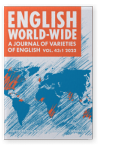Vol. 43:1 (2022) ► pp.33–65
Intensifying and downtoning in South Asian Englishes
Empirical perspectives
As studies on socio-pragmatics in South Asian Englishes and – more generally – postcolonial Englishes are still rare, the present study analyses how age, formality of context, gender, topic of the conversation and type-token ratio of a given speaker influence intensifiers and downtoners in spoken Indian, Sri Lankan and British English as represented in the International Corpus of English. Central research interests cover (a) differences in the frequencies of intensifiers/downtoners regarding these factors and across the varieties studied and (b) variety-specific intensifiers/downtoners in these regional varieties. Two random forest analyses highlight that, while topic and type-token ratio are more important predictors than age and gender, all variables are – to different degrees – sensitive to variety. Possible explanations for a higher incidence of intensifiers/downtoners in British English than in Indian and Sri Lankan English include intensification strategies transferred from indigenous languages or high degrees of uncertainty avoidance in the South Asian speech communities.
Article outline
- 1.Introduction
- 2.Background
- 2.1Indian and Sri Lankan English in the World Englishes paradigm
- 2.2Intensifiers and downtoners
- 3.Methodology
- 4.Analysis
- 4.1Intensifiers
- 4.1.1Quantitative perspectives
- 4.1.2Qualitative perspectives
- 4.2Downtoners
- 4.2.1Quantitative perspectives
- 4.2.2Qualitative perspectives
- 4.1Intensifiers
- 5.Discussion and conclusion
- Notes
-
Corpora used -
References
